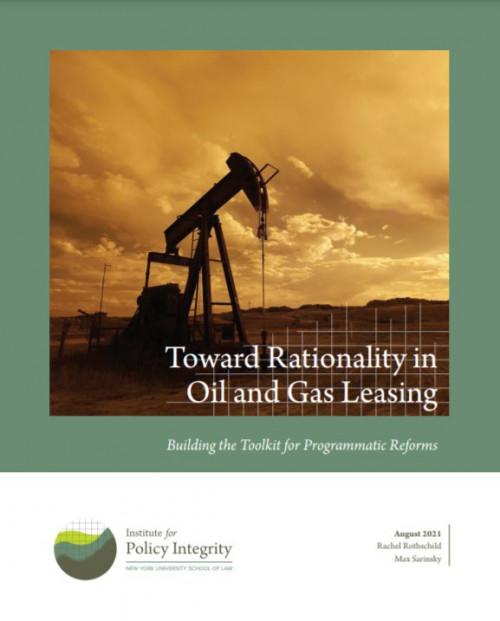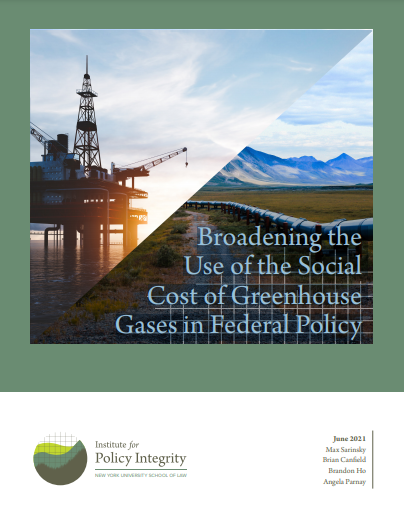-
Comments to EPA and USACE on Clean Water Protections
The Environmental Protection Agency (EPA) and Army Corps of Engineers (USACE) have expressed the intention to repeal the Navigable Waters Protection Rule, which removed critical federal protections on many waterways and has been vacated by a federal court for violating the Clean Water Act. In comments filed to the agencies, we welcome the decision to replace the rule but encourage strong justification for reversing course and point to flaws in the economic analysis for the earlier rule that can support the case for replacing it.
We previously commented on the rule and its flawed economic justification, published a report on its concealed costs, and filed amicus briefs in court cases that challenged it.
-
Comments to FERC on the North Baja Xpress Project
The North Baja XPress Project would provide a significant increase in natural gas compression and transportation, potentially resulting in 9.5 million metric tons or more in downstream greenhouse gas emissions. The Federal Energy Regulatory Commission, however, failed to estimate the project’s total emissions and climate damages. In October 2020, we submitted comments recommending that FERC consider the full range of upstream and downstream emissions and contextualize their impacts using the social cost of carbon.
In our August 2021 follow up letter responding to FERC's draft environmental impact statement for the project, we note that the Commission has taken the helpful steps of quantifying direct and downstream emissions, but should still quantify upstream emissions, assess the project's incremental environmental harms, and consider avenues to mitigate emissions.
-
Comments to FERC on East 300 Upgrade Project
The East 300 Upgrade Project could result in the emission of over 2.3 million tons of downstream emissions in carbon-dioxide equivalence per year from the combusion of natural gas. In March, we submitted comments encouraging the Federal Energy Regulatory Commission to provide a more complete analysis of project emissions and weigh its climate impacts using the social cost of carbon. In August, we followed up with a comment letter regarding the Commission's continued failures to meaningfully assess climate impacts in the project's Draft Environmental Impact Statement.
-
Comments to FERC on the East Lateral XPress Project
The East Lateral XPress Project could result in the emission of over 3.6 million tons of downstream emissions in carbon-dioxide equivalence per year from the combustion of natural gas. We submitted comments (April 2021) and a follow-up letter (August 2021) encouraging the Federal Energy Regulatory Commission to provide a more complete analysis of project emissions, weigh its climate impacts using the social cost of carbon, and consider mitigation measures.
-
Comments to ONRR on Its New Proposal to Rescind Trump-Era Valuation Rule Repeal
In June 2021, the Department of the Interior’s Office of Natural Resource Revenue's (ONRR) proposed a rule rescinding a Trump-era repeal of the Valuation Rule. This rule sought to ensure that states and the federal government receive the full value of royalties due under the law for oil, gas, and coal extracted from public land. We submitted comments supporting ONRR’s proposal to fully rescind the 2020 Rule and encourage ONRR to further elaborate upon its reasons for fully withdrawing the 2020 Rule, in contrast to other alternatives. We lay out several key provisions in the 2020 Rule where ONRR can expand upon its justification for rescinding.
This comment letter follows a long line of advocacy that we've made opposing the Trump-era rule and supporting the valuation processes that it rescinded.
-
Comments to FERC on Marcus Hook Project
The Federal Energy Regulatory Commission has granted the Marcus Hook Compression Project Limited Notice to Proceed with the first phase of construction activities, which is currently underway. Our recent comments on FERC's draft environmental impact statement for the project recommend that the agency improve its consideration of climate impacts. It can do so by quantifying upstream emissions, assessing the project’s incremental climate harms, and considering avenues to mitigate its greenhouse gas contributions.
-
Comments to FERC on LNG Compression Project in New York
Iroquois Gas Transmission System’s Enhancement by Compression Project would provide a significant increase in natural gas compression and transportation, potentially resulting in over 2.4 million metric tons in downstream greenhouse gas emissions. The Federal Energy Regulatory Commission, however, failed to estimate the project’s total emissions and climate damages. We submitted comments recommending that FERC consider the full range of upstream and downstream emissions and contextualize their impacts using the social cost of carbon.
-
Toward Rationality in Oil and Gas Leasing
Building the Toolkit for Programmatic Reforms
Leasing public lands and waters for fossil-fuel extraction drives a quarter of U.S. carbon dioxide emissions. Our new report offers analytic tools for federal leasing decisions to drive policies that maximize economic and environmental welfare—nationally and locally.
-
Broadening the Use of the Social Cost of Greenhouse Gases in Federal Policy
Our working paper highlights numerous areas in which the federal government should apply the social cost of greenhouse gases beyond regulatory cost-benefit analysis. It is organized under the framework of “decision-making, budgeting, and procurement” laid out in the President’s executive order, identifying a number of relevant actions—like environmental reviews conducted under NEPA and the assessment of royalty rates for federal land-management. In short, application of the social cost of greenhouse gases would be extremely beneficial for any executive branch decision with significant greenhouse gas implications.
-
Comments to FERC on Natural Gas Infrastructure
The Federal Energy Regulatory Commission (FERC) issued a notice of inquiry on how to revise its policy on certifying the construction and operation of interstate natural gas transportation facilities. We submitted comments providing numerous recommendations for how FERC can improve its evaluation of environmental impacts and methodology for determining whether there is need for a proposed project.
Viewing recent projects in Natural Resources







